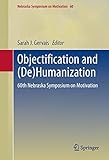Objectification and (De)Humanization : 60th Nebraska Symposium on Motivation / edited by Sarah J. Gervais.
Tipo de material: TextoSeries Nebraska Symposium on Motivation ; 60Editor: New York, NY : Springer New York : Imprint: Springer, 2013Descripción: Ix, 188 páginas 6 ilustraciones recurso en líneaTipo de contenido:
TextoSeries Nebraska Symposium on Motivation ; 60Editor: New York, NY : Springer New York : Imprint: Springer, 2013Descripción: Ix, 188 páginas 6 ilustraciones recurso en líneaTipo de contenido: - texto
- computadora
- recurso en línea
- 9781461469599
- HM1001-1281
Springer eBooks
Objectification and (De)humanization brings together a wealth of scholarship from across psychology and the social sciences to illuminate how we understand "human-ness" and to focus on the many ways that those human qualities are minimized--and frequently denied--in others. “They're all alike. I have no use for them. They're not like us-- they're barely human.” These statements are easily recognized as different degrees of stereotyping, bigotry, and discrimination. But psychologically speaking, these inaccurate perceptions of people show other, deeper, forces at work: objectification, the reduction of people to specific parts or functions, and dehumanization, the treating of humans as animals or inanimate objects. This forward-looking Volume in the Nebraska Symposium on Motivation offers research on dehumanization and objectification as experienced by both the targets and the initiators of these processes for clear insights into their effects on individual mental health and societal well-being. The theories in this book carry wider implications for action, from addressing various forms of pathology to advancing social justice. Included in the coverage: Moving towards a unified theory of objectification and dehumanization. A terror management perspective on the objectification of women. Pity, disgust, other? Varieties of dehumanization. Self-objectification as justification of unjust systems. Treating pets as people/treating people as animals. Considering a pan-theoretical approach to objectification and dehumanization. Objectification and (De)humanization is a groundbreaking reference for social psychologists, cognitive psychologists, clinical psychologists, and experimental psychologists as well as researchers in gender studies, anthropologists, and sociologists. Its depth of analysis is a testament to our continued recognition of our shared humanity.
Para consulta fuera de la UANL se requiere clave de acceso remoto.


